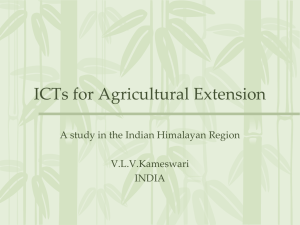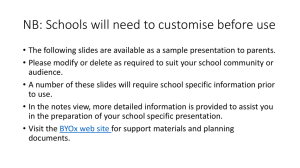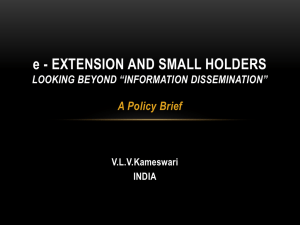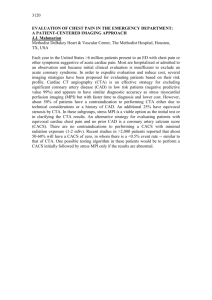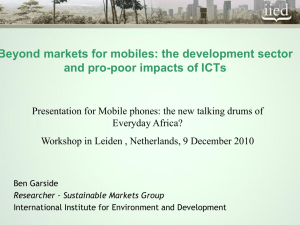Background information
advertisement
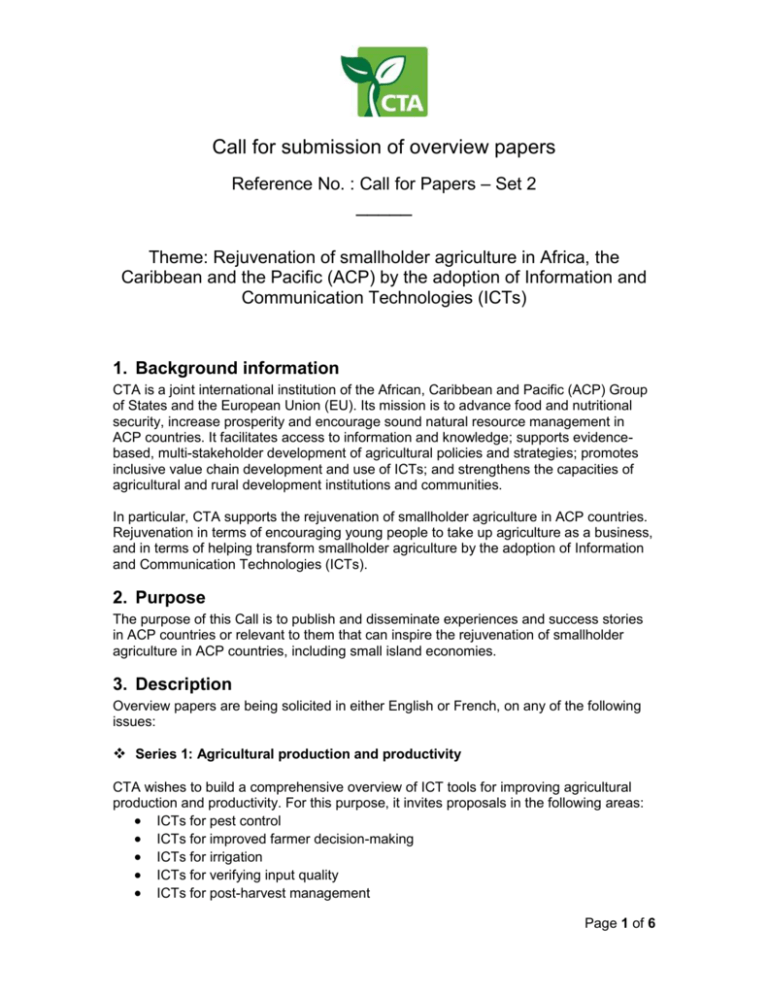
Call for submission of overview papers Reference No. : Call for Papers – Set 2 _____ Theme: Rejuvenation of smallholder agriculture in Africa, the Caribbean and the Pacific (ACP) by the adoption of Information and Communication Technologies (ICTs) 1. Background information CTA is a joint international institution of the African, Caribbean and Pacific (ACP) Group of States and the European Union (EU). Its mission is to advance food and nutritional security, increase prosperity and encourage sound natural resource management in ACP countries. It facilitates access to information and knowledge; supports evidencebased, multi-stakeholder development of agricultural policies and strategies; promotes inclusive value chain development and use of ICTs; and strengthens the capacities of agricultural and rural development institutions and communities. In particular, CTA supports the rejuvenation of smallholder agriculture in ACP countries. Rejuvenation in terms of encouraging young people to take up agriculture as a business, and in terms of helping transform smallholder agriculture by the adoption of Information and Communication Technologies (ICTs). 2. Purpose The purpose of this Call is to publish and disseminate experiences and success stories in ACP countries or relevant to them that can inspire the rejuvenation of smallholder agriculture in ACP countries, including small island economies. 3. Description Overview papers are being solicited in either English or French, on any of the following issues: Series 1: Agricultural production and productivity CTA wishes to build a comprehensive overview of ICT tools for improving agricultural production and productivity. For this purpose, it invites proposals in the following areas: ICTs for pest control ICTs for improved farmer decision-making ICTs for irrigation ICTs for verifying input quality ICTs for post-harvest management Page 1 of 6 Call for Papers – Set 2 ICTs for food security and policy decision-making Other proposals related to innovative use of ICTs for improving agricultural production and productivity. In each of these cases, the paper should: o Provide a comprehensive overview of the existing softwares/mobile applications: what are they used for and in which context(s)? who are the users? what are their outreach and impact (through examples based on real cases)? what are their availability and costs for users? what are the lessons learnt from experiences (success factors and constraints to dissemination and adoption by users)?… o With particular reference to the specific area, explain how these softwares/mobiles applications are contributing to improving agricultural production and productivity and what they bring which is new in terms of approaches to agriculture development and services to agriculture. o Draw a conclusion that discusses a) what are the likely developments in this area in the next 2-3 years; and b) what can governments and/or the international community, on one hand, and the private sector, on the other, do to ensure that available ICTs are used to maximum effect. Series 2: Agricultural marketing and finance CTA wishes to build a comprehensive overview of ICT tools for agricultural marketing and finance. For this purpose, it invites proposals in the following areas: ICTs for contract farming ICTs for linking farmers to markets ICTs to support agricultural warehousing and warehouse receipts ICTs for commodity exchanges: the current state of play ICTs in support of agricultural credit Other proposals related to innovative use of ICTs in agricultural marketing and finance. In each of these cases, the paper should: o Provide a comprehensive overview of the existing softwares/mobile applications: what are they used for and in which context(s)? who are the users? what are their outreach and impact (through examples based on real cases)? what are their availability and costs for users? what are the lessons learnt from experiences (success factors and constraints to dissemination and adoption by users)? o With particular reference to the specific area, explain how these softwares/mobiles applications are changing the approach towards agricultural marketing and finance and what they bring which is new. o Draw a conclusion that discusses a) what are the likely developments in this area in the next 2-3 years; and b) what can governments and/or the international community, on one hand, and the private sector, on the other, do to ensure that available ICTs are used to maximum effect. Page 2 of 6 Call for Papers – Set 2 Series 3: Sector-specific ICT supports CTA wishes to build a comprehensive overview of ICT tools for specific agricultural value chains, from production to marketing. For this purpose, it invites proposals in the following areas: ICTs for the fisheries sector ICTs for the livestock sector ICTs for the cereals sector ICTs for roots and tubers ICTs for vegetable and horticultural crops Other proposals related to innovative use of ICTs for specific agricultural value chains. In each of these cases, the paper should: o Provide a comprehensive overview of the existing softwares/mobile applications: what are they used for and in which context(s)? which component(s) of the value are they supporting and who are the users? what are their outreach and impact (through examples based on real cases)? what are their availability and costs for users? what are the lessons learnt from experiences (success factors and constraints to dissemination and adoption by users)? o With particular reference to the specific value chain, explain how these softwares/mobiles applications are changing the way the value chain is managed and what they bring which is new. o Draw a conclusion that discusses a) what are the likely developments in this area in the next 2-3 years; and b) what can governments and/or the international community, on one hand, and the private sector, on the other, do to ensure that available ICTs are used to maximum effect. 4. Rules for the Call 4.1. Eligibility Participation in this call is open equally to natural and legal persons of the ACP States and EU Member States, and to international organisations. 4.2. Procedure Step 1 Interested persons should submit up to two (2) proposal(s) of maximum three pages long. The proposal should include: 1. Reference of the call 2. Proposed title and name of author(s) (and organisations, as needed) 3. Full contact details 4. A brief biography and a paragraph explaining why the author, or group of authors, is/are the right person(s) to write about the paper. 5. An outline of the overview paper, including for each section a brief narrative summary of the content that will be developed. Page 3 of 6 Call for Papers – Set 2 Proposals have to be sent by email at the following address: ctapapers@cta.int. They have to reach CTA no later than Sunday 13 October 2013, 20:00 GMT. Step 2 Proposals will be reviewed and selected by an evaluation committee. Author(s) whose proposals are accepted will be notified no later than Friday 18 October 2013. They will be invited to submit a full ORIGINAL paper, i.e. unpublished material in any language, any form, and by any means. Step 3 Full papers will have to be sent by email and reach CTA no later than Sunday, 24 November 2013, 20:00 GMT. Overview papers (minimum 9,000 to maximum 10,000 words) shall include the following structural elements: a. b. c. d. e. f. Proposed title Name of author(s) (and organisations, as needed) Executive summary Introduction Text of the sections (including for each section proposed: title, short headlines highlighting key points, pull-out quotes, charts, tables, illustrations and their captions, and 2 to 3 short boxes as needed) References (sources consulted or recommended) Full papers will be reviewed by an evaluation committee on the basis of the following criteria: Does the paper meet expectations? Criteria Quality of writing and readiness for publication (2 points: only requires minor editing) Completeness of paper: does it fully cover the subject matter? Sufficient level of detail and hard information (e.g., are references to websites, if applicable, given?) Fully Partly Insufficiently 2 1 0 2 1 0 2 1 0 The panel may decide that the paper: o o does not meet the required minimum quality expected (less than 4 points), and reject the paper can be accepted subject to either minor revisions or major revisions. In the latter case, the paper will be returned to its author(s) – no later than Friday 6 December. The revised paper will have to be sent back to CTA no later than 15 December 2013, 20:00 GMT. Page 4 of 6 Call for Papers – Set 2 Author(s) will be informed in writing of evaluation committee’s decision concerning their paper. No recourse will be possible against an evaluation committee’s decision. 4.3. Control of manner of publication CTA will have the right to publish, market and distribute for free the papers in any form, manner and style which it considers best suited to the exploitation of the paper (e.g. ICTupdate magazine print and online, CTA’s Policy Briefs series). CTA will have the entire control of the production, publication and reprinting, including without limitation, the design, format, paper, print run, binding, cover, jacket (if any), advertising and distribution. 4.4. Copy-editing and proofs CTA will have the right to edit the papers at its expense for the purpose of improving its consistency, clarity or suitability for its intended readership. The author(s) will have the right to approve significant changes and deal with queries before the typescript of the Work is set in proof. The author(s) undertake(s) to deal with any queries, review significant changes and return the results of this work to CTA within 7 days after receipt. 4.5. Permissions Author(s) will be solely responsible for obtaining, at his or her(their) own expense, all materials necessary for the preparation of their paper(s) and all necessary permissions in writing to use in their paper(s) any third party material (including, without limitation, all data and quotations of whatever nature, and all text, tables and illustrations) for all editions and all forms of exploitation of the Work. 4.6. Copyright and other intellectual property rights Author(s) irrevocably and unconditionally assign(s) to CTA all copyright, rights in the nature of copyright and all other intellectual property rights throughout the world (present and future, and including without limitation all renewals, extensions, revivals and restorations thereof and accrued rights of action in respect thereof) in the paper(s). In consequence of this assignment, author(s) agree(s) that CTA will (without limitation) be entitled to produce, publish, adapt, promote the paper(s) or any translation, adaptation or abridgement of the paper(s) in any form and in any language. CTA will use reasonable endeavours to ensure that the author(s) is(are) identified as the author of the paper(s) whenever the paper(s) is(are) published in its(their) entirety by CTA. Subject to this, the author(s) irrevocably and unconditionally waive(s) his or her(their) moral rights he or she(they) may have in any territory of the world. 4.7. Warranties Author(s) warrant(s) to CTA and its assigns and licensees that he/she is or they are the sole author(s) of the paper(s) and sole owner(s) of all of the rights assigned to CTA; that the paper(s) is or are (an) original work(s) and has or have not previously been published in any form and any language anywhere in the world; that the paper(s) is or are in no way whatsoever a violation or infringement of any existing copyright, moral right, database right, or of any right of privacy, or other intellectual property, personal, proprietary or statutory right; that the paper(s) contain(s) nothing which would be harmful to any person acting in accordance with information or advice contained in it, or to the economic or other interests of such person; that paper(s) contain(s) nothing misleading, Page 5 of 6 Call for Papers – Set 2 obscene, improper, blasphemous, libellous or defamatory or otherwise unlawful; that all statements contained in paper(s) purporting to be fact are to the best of the author’s(authors’) knowledge and belief true. 4.8. Fees CTA agrees to pay to the author(s) upon submission of their accepted revised paper(s) the following fees: 4,500 Euros per paper (minimum 9,000 to maximum 10,000 words). Author(s) accept(s) he or she(they) will not under any circumstances be entitled to any other payment or royalty for their paper(s). No payment will be made for proposals that have been rejected. Page 6 of 6
